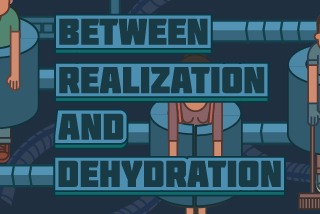
“Between Realization and Dehydration” – a comprehensive report published by the Association for Civil Rights in Israel (ACRI) – presents for the first time the processes and methods by which successive Israeli governments have cut back social services over the past three decades. Housing, education, heath, employment, welfare and more – all these were drained as Israel turned itself into a country where many people find it difficult to exercise their right to a dignified life and an adequate standard of living. These were not accidental, but rather the consequences of years of active policies, including:
- Budget cuts in government ministries, in a manner that severely damaged the quality of social services (such as housing, education, employment, and welfare).
- Massive privatization, without public debate or adequate governmental monitoring (such as in the welfare system, the drug rehabilitation system, student health services, higher education, and more).
- Using the legislative branch as a rubber stamp for overturning social legislation in the Arrangements Law or for thwarting bills that promote social rights (such as public housing, early childhood education, and contract employees’ rights).
- Failure to implement laws and court rulings (such as the enforcement of workers’ rights, the obligation to provide public education, and the rights of the disabled to employment and accessibility).
- Tax policies that reduced state revenues, prevented adequate allocation of budgets for social services, and even widened social disparities by reducing progressive, direct taxes and increasing regressive, indirect taxes.
- Crushing the opposition by delegitimizing labor unions and workers’ struggles, blaming the poor for their condition, allocating divisive benefits, and more.
- Backing from the judicial system (and the Supreme Court in particular), which did little to prevent violations of social rights. Petitions against cutbacks in income insurance and benefits for the elderly were rejected, as were petitions for the right of special needs students to be integrated into educational frameworks and others.
The report includes testimonials from former high-ranking officials in the civil service, who describe from their experience how the “draining” process was used to diminish social services in different government bodies. The interviewees come from the Ministry of Finance, Ministry of Housing, Ministry of Education, National Insurance Institute, the Attorney General’s Office, and the Employment Services.
According to Attorney Tali Nir, Director of ACRI’s Social and Economic Rights Department and author of the report: “The report attempts to unravel the processes that led hundreds of thousands of Israeli citizens to take to the streets and demand social justice. Now that many people understand that the problem lies not with them, but rather that it is part of a long-standing and systematic government policy, the time has come to understand how this policy was implemented. The reduction of social services violated the rights of Israeli residents to education, health, housing, employment, and welfare, and led to a dramatic widening of social gaps.
“ACRI’s report enables us to see the bigger picture. Whoever reads it and later hears of another inefficient public service will know to inquire about the government’s role in the situation. Whoever discovers another service privatized will know that it’s not necessarily fate. The report is a practical tool for every citizen who seeks a better understanding of how these processes influence us, and I hope that it will bring about a public debate on governmental modes of action.”
“Although the report paints a grim picture, there is also a ray of light: social struggles that succeeded, such as the struggle for disability rights, the campaign against the “Wisconsin Plan,” the campaign on the profits of natural gas companies, and others.”
Please click on the links below to access the report:
Complete Report: Hebrew
Executive Summary: Hebrew | English (word) | Arabic








Pingback: “They got us stoned on this conflict” « Land der Verheißung